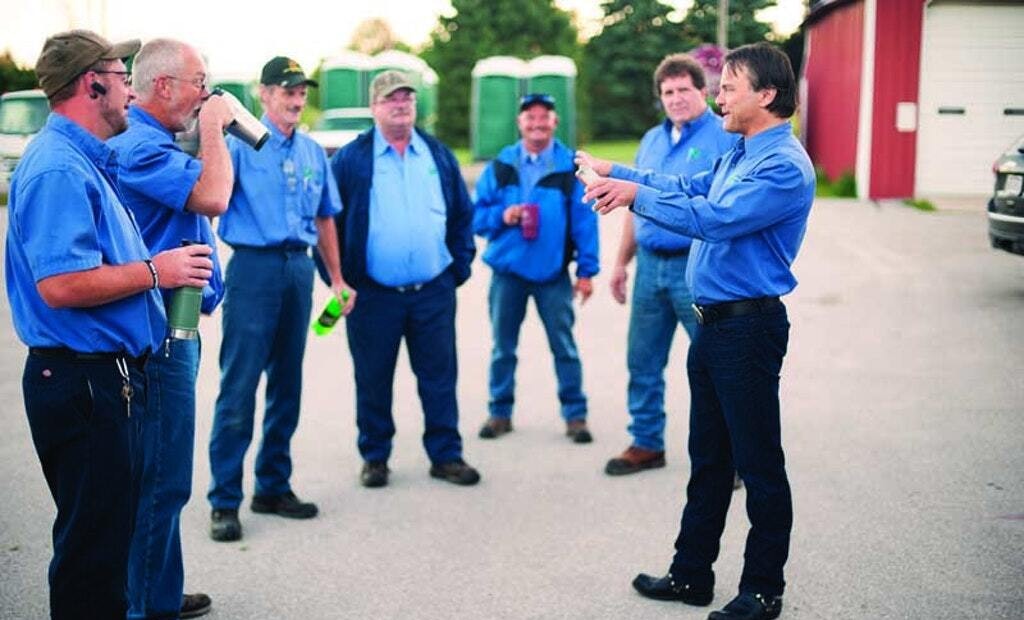Interested in Business?
Get Business articles, news and videos right in your inbox! Sign up now.
Business + Get AlertsToday's leadership strategies are stepping away from self-serving approaches and shifting focus towards the holistic growth and wellbeing of individuals. Brian Hess, president and CEO of The Pavement Group, argues that this evolution has positioned people-centric leadership not merely as a business advantage, but also as a moral and ethical imperative.
Hess' career path was from sales to sales leadership to leadership, starting in technology and moving to construction, where he has been for several years. He cites ongoing shifts in employee expectations. From the dirty, risky work environments of the early 1900s to the highly productive and specialized workplaces of the 1950s to today’s market where flexibility and accommodation are the norm, employee expectations have driven shifts in what employers must provide.
The latest trend? “There’s been a generational shift and it’s showing up in the talent pool: younger workers want purpose. This is the natural evolution of the employee,” says Hess. “More than that, however, employees now seek good leadership.”
And what is good leadership? That has also evolved, says Hess, and now is more people focused. Providing an environment where individuals can thrive and grow does provide benefits to the employer, but that’s no longer the sole or even the primary driver for doing so. There is now the sense that good leadership that encourages individuals’ growth is the morally responsible, ethical thing to do.
Hess offers specifics for doing the right thing, but also a summary. “You want to create a culture where people enjoy doing business with you and employees enjoy being part of the company. You want to find ways every day to act out the valuing of people.”
The Pavement Group model
The Pavement Group is a nationwide asphalt and concrete paving management company. The ideal client is a large property owner with hundreds or even thousands of properties and in some cases more than a million square feet of pavement. The Pavement Group provides a technology-based, data-driven service primarily for the maintenance of pavement with a secondary emphasis on the replacement of pavement. Their headquarters are in Pittsburg, Pennsylvania and they have offices in Boston, Massachusetts, and New Richmond, Wisconsin.
The Pavement Group builds a culture of caring in many ways, much of the effort related to community activity. They give back 10% of their net each year to their local communities. They do a lot with kids, including supporting Steel City Impact, a youth-centered program in the Greater Pittsburgh area that provides mind, body and spirit-based development and mentoring opportunities to the community's youth. They support local churches. Their support of high school athletes includes support of the entities with which those athletes are associated through the Name, Image, Likeness program.
Three keys to building a caring culture
Hess offers three tips for companies seeking to create a caring culture in their workplaces.
1. Communication is key. Find out what people have to say; find out what matters to them.
2. Educate team members and emphasize ongoing self-improvement. The Pavement Group offers training, books, conferences and more.
3. Emphasize that the culture values people. Be clear and consistent with this message.
While it’s true that altruism is the main driver for this effort, the real results for the business cannot be denied. The Pavement Group recently hired a husband and wife, both with doctorates in physical therapy, who were attracted to the company by the culture and the opportunity for meaningful growth, both personally and professionally. “Doing all the right things consistently will yield the right results, for the person and the company,” says Hess.
Hess’s commitment to leadership is also seen in Top Contractor School, which he founded in 2018. That service has extensive training for individuals and teams in sales and operations and has had 650 contractors enroll since the program was founded.
About the author: AEM is the North American-based international trade group representing off-road equipment manufacturers and suppliers, with more than 1,000 companies and 200-plus product lines in the agriculture and construction-related sectors worldwide. AEM has an ownership stake in and manages several world-class exhibitions, including CONEXPO-CON/AGG.






